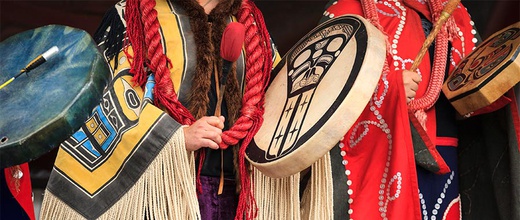The views expressed in our content reflect individual perspectives and do not represent the official views of the Baha'i Faith.
From the very beginning of the Baha’i Faith—which started with the revelation of The Bab—the Baha’i teachings aligned remarkably with many Indigenous beliefs.
From 1844-1850, when The Bab, the Herald of Baha’i Faith, unfurled his revelation, he taught a number of truths also deeply held by Indigenous peoples around the world.
Baha’u’llah, the prophet and founder of the Baha’i Faith, also revealed truths that echo throughout the teachings of Indigenous peoples. The Baha’i teachings, just as many Indigenous traditions do, emphasize this commonality by starting with the essential context, the existence of the human being in the world:
Now, let us make ones like unto you and me, so that they may rule over and enjoy these lesser creatures,” sang Tawa, and Spider Woman shaped the Thoughts into woman and man figures like unto their own. – the Hopi Creation Story
And God said, Let us make man in our image, after our likeness: and let them have dominion over the fish of the sea, and over the fowl of the air, and over the cattle, and over all the earth, and over every creeping thing that creepeth upon the earth. – Genesis 1:26-28.
From this ancient context of humans having dominion over the Earth emerges our responsibility to the Creator and the creation, according to The Bab:
Whoso possesseth power over anything must elevate it to its uttermost perfection that it not be deprived of its own paradise. … should he know of a higher degree of refinement and fail to manifest it …. he would deprive it of its paradise, and he would be held accountable, for why has thou, despite the possession of means, withheld the effusion of grace and favor. – The Bab, the Persian Bayan, 4:11.
The UCLA professor and Babi and Baha’i scholar Nader Saiedi expounded on this passage in his book Gate of the Heart:
We can see, in the spiritualized utilitarianism of the Bab, as well as in His universal imperatives, that one should take into account not only the interests of human beings, but the interests of all created things because the realm of nature is endowed with moral rights as well as spiritual significance. – p. 316.
Those who study the wisdom, belief systems and spiritual insights of Indigenous peoples recognize that the Earth sustains us all, giving us the gift of life. That gift, like all gifts, requires reciprocity:
Each person, human or no, is bound to every other in a reciprocal relationship. Just as all beings have a duty to me, I have a duty to them. If an animal gives its life to feed me, I am in turn bound to support its life. If I receive a stream’s gift of pure water, then I am responsible for returning a gift in kind. An integral part of a human’s education is to know those duties and how to perform them. – Robin Wall Kimmerer, Braiding Sweetgrass: Indigenous Wisdom, Scientific Knowledge and the Teachings of Plants.
This Indigenous view, which much of modern civilization seems to have lost or never considered, coheres consistently with the Bab’s teachings about our environment, according to Nader Saiedi:
The Bab’s Arabic Bayan prohibits the commodification of the natural elements of fire, air, water, and earth. The Bab turns the idea of the purity of water into the protection of the environment. In the Persian Bayan He writes:
Nothing is more beloved before God than to keep water in a state of the utmost purity, to such an extent that if a believer should become aware that the glass of water he holdeth in his hand hath passed through any impure parts of the earth, he would be grieved. – The Bab, cited in Gate of the Heart, p. 316.

















Comments
Sign in or create an account
Continue with Facebookor